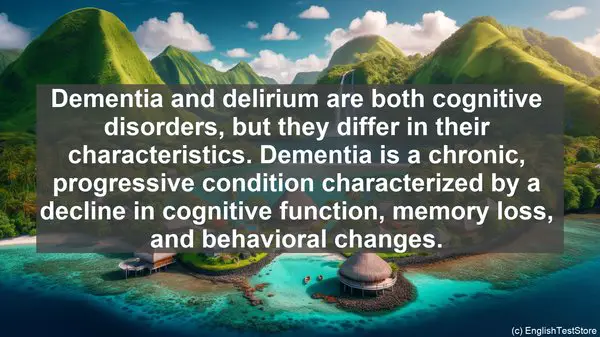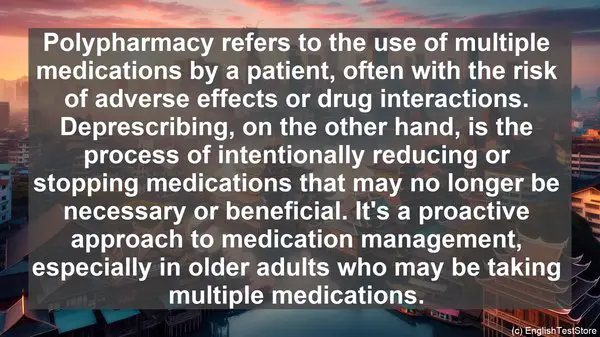Introduction
Welcome to today’s lesson on geriatric medicine. In this lesson, we’ll be focusing on a topic that often trips up even the most experienced medical professionals: commonly confused words. Understanding the nuances between these words is crucial in providing accurate care to elderly patients. So, let’s dive in!

1. Comorbidity vs. Multimorbidity
The terms ‘comorbidity’ and ‘multimorbidity’ are often used interchangeably, but they have distinct meanings. Comorbidity refers to the presence of one or more additional conditions alongside a primary condition. On the other hand, multimorbidity refers to the coexistence of multiple chronic conditions, regardless of their relationship to each other. So, while all cases of multimorbidity involve comorbidity, not all cases of comorbidity involve multimorbidity.
2. Dementia vs. Delirium
Dementia and delirium are both cognitive disorders, but they differ in their characteristics. Dementia is a chronic, progressive condition characterized by a decline in cognitive function, memory loss, and behavioral changes. Delirium, on the other hand, is an acute, fluctuating condition that often occurs due to an underlying medical issue or medication. It’s important to differentiate between the two, as the management and treatment approaches vary significantly.
3. Palliative Care vs. Hospice Care
While both palliative care and hospice care focus on improving the quality of life for patients with serious illnesses, there are some differences. Palliative care can be provided at any stage of an illness and is aimed at relieving symptoms and addressing the patient’s physical, emotional, and spiritual needs. Hospice care, on the other hand, is specifically for patients with a terminal illness and focuses on providing comfort and support in the final stages of life.
4. Polypharmacy vs. Deprescribing
Polypharmacy refers to the use of multiple medications by a patient, often with the risk of adverse effects or drug interactions. Deprescribing, on the other hand, is the process of intentionally reducing or stopping medications that may no longer be necessary or beneficial. It’s a proactive approach to medication management, especially in older adults who may be taking multiple medications.
5. Activities of Daily Living (ADLs) vs. Instrumental Activities of Daily Living (IADLs)
ADLs and IADLs are terms used to assess a person’s functional abilities. ADLs refer to basic self-care tasks like bathing, dressing, and eating. IADLs, on the other hand, encompass more complex activities like managing finances, cooking, and using transportation. Assessing both ADLs and IADLs is important in determining a person’s level of independence and the need for assistance.
6. Geriatrics vs. Gerontology
While both geriatrics and gerontology focus on the study of aging, there is a distinction. Geriatrics is a branch of medicine that specializes in the care of older adults, including their medical, social, and psychological needs. Gerontology, on the other hand, is a multidisciplinary field that encompasses the study of aging from various perspectives, including biology, psychology, and sociology.

7. Frailty vs. Disability
Frailty and disability are related concepts but differ in their scope. Frailty refers to a state of increased vulnerability and decreased physiological reserve, often associated with aging. Disability, on the other hand, is a broader term that encompasses any condition or impairment that limits a person’s ability to perform certain activities. While frailty can contribute to disability, not all disabilities are due to frailty.
8. Geriatric Syndromes vs. Disease
Geriatric syndromes are a set of conditions commonly seen in older adults that often have multifactorial causes and are associated with functional decline. Examples include falls, delirium, and incontinence. While these syndromes may share similarities with specific diseases, they are distinct in their etiology and management. Recognizing and addressing geriatric syndromes is crucial in comprehensive geriatric care.
9. Polypharmacy vs. Inappropriate Prescribing
Polypharmacy, as we discussed earlier, refers to the use of multiple medications. Inappropriate prescribing, on the other hand, refers to the use of medications that may pose more harm than benefit, either due to the choice of drug, dosage, or potential interactions. While polypharmacy itself may not always be inappropriate, it increases the risk of inappropriate prescribing and adverse drug events.
10. Advance Directive vs. Living Will
Both advance directives and living wills are legal documents that allow individuals to express their healthcare wishes in advance. However, there is a difference. An advance directive is a broader term that encompasses various documents, including living wills, durable power of attorney for healthcare, and do-not-resuscitate orders. A living will, specifically, outlines a person’s preferences regarding life-sustaining treatments in the event they are unable to communicate.
